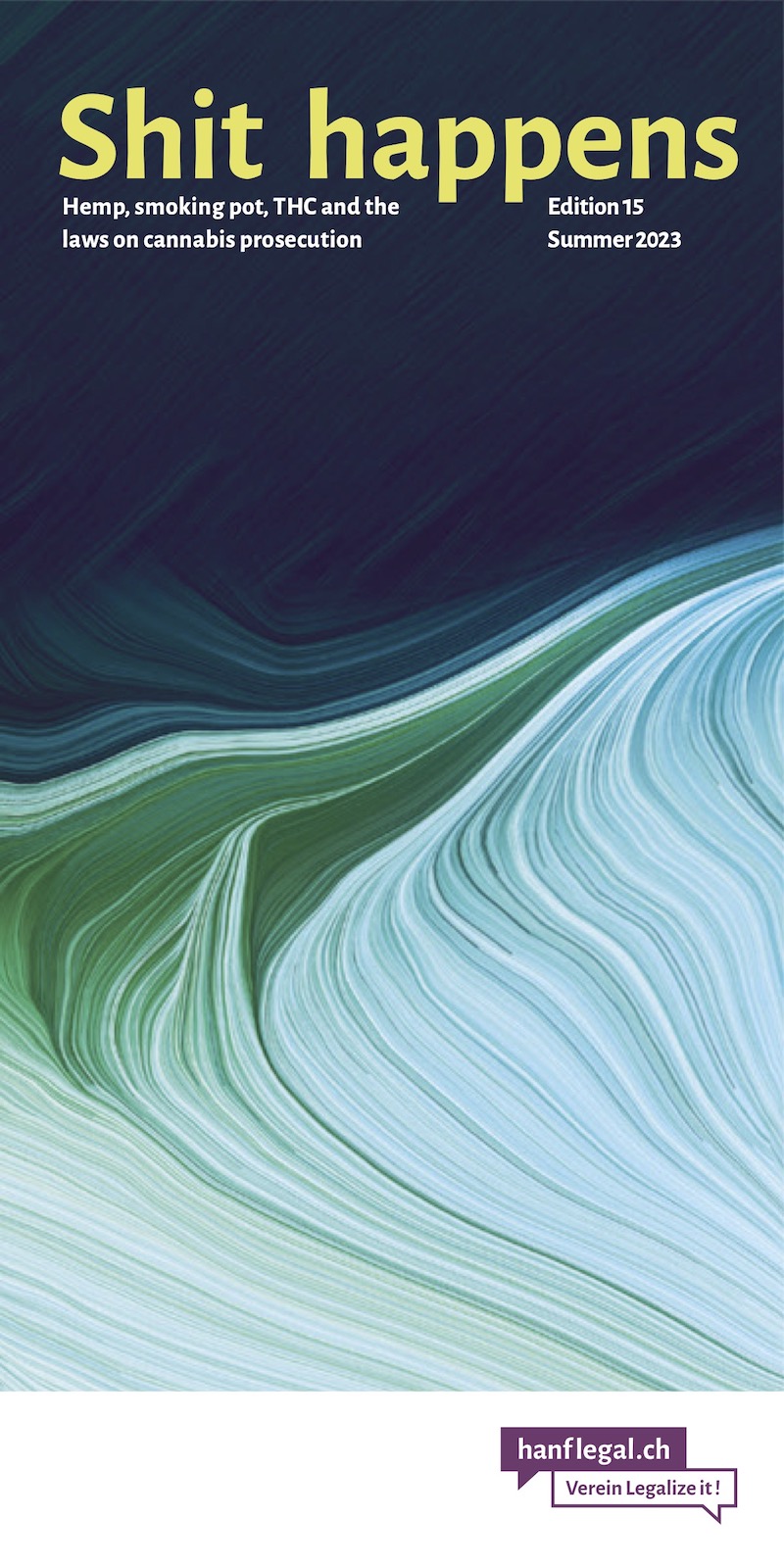- THC & Law:
The inconsistent application of the fixed penalties and the provisions in the new Fixed Penalties Act.
Since 2013, fixed penalties can be issued for cannabis use. The cantons apply the regulations differently, which has created a very confusing situation. And: reprimands still exist!
Federal law, cantonal implementation
Since October 2013, it has been legally possible in Switzerland to punish cannabis use observed by the police with a fixed penalties (OB) (à 100 francs).
However, criminal prosecution is a matter for the cantons, which has led to enormous differences in its application. Each canton must determine exactly which authorities may issue OB (e.g., cantonal, municipal, regional, administrative, transport police, border guard corps; uniformed officers only or civilian officers as well). There are different authorities and those who are not allowed to distribute OB must continue to show.
A blatant example: The canton of Zurich has about 1.4 million inhabitants, the canton of Bern about 1 million. So Bern should give about two thirds as many OB as Zurich. But instead, Bern has almost no OBs at all. In addition, the number of OBs in Zurich has decreased massively, while the number in Bern has remained the same:
| Canton | 2016 | 2017 | 2018 |
|---|---|---|---|
| Zurich | 4286 | 3053 | 915 |
| Bern | 203 | 196 | 203 |
Huge differences, then!
With or without uniform?
At the end of last year, it became clearer to us why there are such stark differences.
⇒ In the canton of Bern, only uniformed police officers are allowed to issue fixed penalties. So you practically have to run into uniformed officers with your joint to get a fixed penalty. Civilian officers are not allowed to issue fixed penalties, so they have to report the person normally.
⇒ In the canton of Zurich, OB used to be issued even for the mere possession of an unpunished minor amount of cannabis (up to 10 grams). This was against the law, because OB can only be issued for observed consumption, not for possession. At the end of 2017 (we reported in LI79), the Federal Supreme Court provided clarity: penalty-free means penalty-free. Now many cantons seem to have come to terms with this. They do not give OB for this smallest possession and also do not create report anymore. However, it seems that the material is confiscated and destroyed everywhere.
Actually I wanted to create here a total overview of all cantons and all authorities, which police departments are now allowed to issue OB. But I did not manage to do it. There are simply too many and in each canton there are again different regulations.
The disintegration of the fixed penalties
A similar development as in Zurich occurred in these cantons:
| Canton | 2016 | 2017 | 2018 |
|---|---|---|---|
| Geneva | 2405 | 2264 | 629 |
| Wallis | 955 | 1426 | 608 |
| Freiburg | 981 | 874 | 479 |
| Aargau | 1163 | 403 | 358 |
| Vaud | 3110 | 3287 | 284 |
| Lucerne | 799 | 547 | 299 |
Here we can assume that OBs are now really only issued for observed consumption, not (anymore) also for the possession of an unpunished amount without consumption. The probability that those concerned are also no longer reported is quite high, otherwise the number of reports would have had to increase massively - but this did not happen in 2018 (see article and graphs on the next pages). However, some question marks remain. In the following cantons, the number of OBs remained practically constant, contrary to the trend:
| Canton | 2016 | 2017 | 2018 |
|---|---|---|---|
| St. Gallen | 1280 | 1385 | 1171 |
| Ticino | 733 | 969 | 859 |
How exactly these cantons proceed is unclear. In addition, as I write this, I have a person from St. Gallen on the phone, where the possession of about 5 grams of cannabis resulted in a fine incl. fees of 1,700 francs (the outcome of this case is currently still open).
The new fixed penalties law
A few years ago, there were discussions to create a separate Fixed Penalties Act (OBG) that would be responsible not only for the long list of road traffic OBs, but for all OBs.
Now, as of 1/1/20, OB will be removed from NarcA (articles 28b to 28l) and regulated in the new OBG or Fixed Penalties Ordinance (OBV). This business has been decided for some time (we have reported in LI77), but the cantons, which then have to implement these provisions, needed some preparation time for this change.
The OBG states that OB can only be issued for contraventions of ten listed laws, including the NarcA.
OB may be issued by police bodies and authorities that have been designated as competent by the cantons. Thus, there may still be differences between the cantons in the application of OB provisions. Nevertheless, the new OBG only states that the officers must identify themselves to the accused person - there is no mention of a uniform requirement. They must have detected the violation themselves (previously: observed).
While OB can generally be given to accused persons from the age of 16, the OBG states that OB for offences against the NarcA are only possible for adults. Juveniles will always be reported as before.
The new Fixed Penalties Ordinance
The concrete facts and amounts of fixed penalties are defined in the OBV, the NarcA can be found in Annex 2, Chapter VIII. Under the OB-No. 8001 it says:
“Unauthorized intentional consumption of narcotics of the effect type cannabis (Art. 19a No. 1 NarcA) ⇒ 100 francs” We will see if the cantons will bring themselves to punish cannabis consumption generally with an OB from 2020 and if non-uniformed officers will be allowed to do so everywhere.
In any case, no one should think that it is mandatory to get an OB for cannabis use if you get caught. It should be so, but authorities can (and probably will, as the past has shown) proceed differently - and then it can quickly come to report. Therefore, affected persons should always expect that there may be a interrogation. Consumers should familiarize themselves with the associated problems in advance! Further information: hanflegal.ch/prosecution
Support our work with a donation:
Bank transfer
Account number (IBAN):
CH02 0900 0000 8709 1354 3
Full account details
Or scan this QR code with your eBanking App (ZKB, Revolut, Postfinance, …):

Or open/share the QR code as PDF file with your eBanking App.
Credit card
Donate via credit card
Verein Legalize it!
Quellenstrasse 25
8005 Zürich
Threema ID 7NH65RBY
Don’t miss anything! Follow us on social media:
